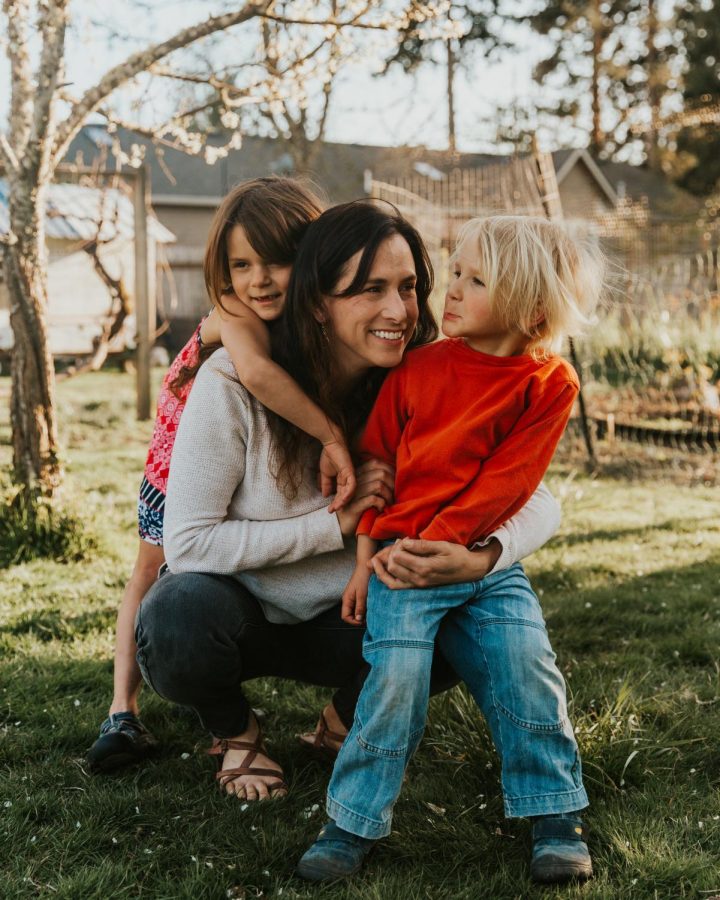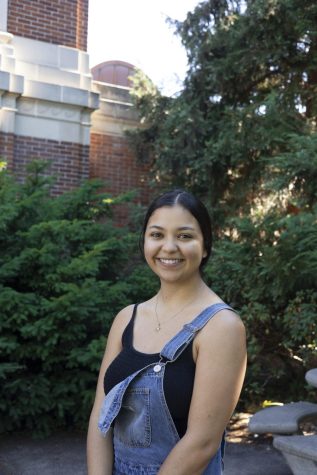Parents cope with COVID-19
May 2, 2020
After COVID-19 was declared a global pandemic, parents and families are having to acclimate to the new circumstances that are rapidly changing the ways in which they are raising their children.
The Oregon Health Department closed all K-12 schools following a stay-at-home order by Governor Kate Brown, directing Oregonians to only leave their homes for essential business. To remedy schools closing, district administrators have started remote learning, causing parents to set aside amounts of their time to teach their children.
Parents who are also students at Oregon State University and relied on daycare services throughout the school week are now becoming accustomed to the new circumstances in whatever ways they can.
“I’ve always relied on study rooms at the library to get [a] quiet space to study, [but,] the bedrooms in our apartment don’t have locks on the door, so I put dumbbells in front of the door when I need to make sure I’m being uninterrupted if I’m taking an online test,” said Karlie Wiese, a fourth-year OSU student and mother to her four-year-old daughter.
Not only is Weise a student at OSU, but she is also a teaching assistant for the online general chemistry courses, which requires at least three-hour sessions to conduct classes and grade assignments. For faculty and professors at OSU, parenting during this COVID-19 era is nothing short of a balancing act.
“I’m not teaching this term but my husband is and we are trying to work from home while homeschooling our children who are in elementary school,” said Megan McClelland via email, a human development and child services professor at OSU. “It’s been a challenge but we are getting into a good schedule and routine and trying to work together. It’s brought us closer together as a family, although teaching your own children is not for the faint of heart.”
Weise, McClelland and other parents in Corvallis, Ore. relied on taking their children to preschools or daycares prior to COVID-19. Now, many schools are conducting lessons through online video conferencing, requiring parents to assist with class sessions.
This education plan is similar to that of local Corvallis and Albany, Ore. school districts, which are relying heavily on the support of parents to help teach the materials to their children.
“The school has said they don’t want parents to fill the role of ‘teacher’ basically… and Albany’s school district hasn’t really sent out a curriculum,” said Severina Lingo, a mom of three. “I imagine other parents also feel the pressure, even though they said they don’t have that expectation but we, of course, want our kids to learn. So, it’s challenging.”
Lingo has three children ages six, four and two, whom she raises with the help of her husband. She has been furloughed from her work indefinitely, and her husband is a nurse at Corvallis Good Samaritan Regional Medical Center, dealing with COVID-19 patients.
Lingo said the only available time to do the schoolwork with her preschooler is when the two-year-old is napping, filling up what used to be free space in the day to relax.
“For me, I try to wake up before the kids; that’s always been something I’ve had as a goal and now it’s even more crucial, I really have to wake up at least an hour before they do and have my coffee and time to myself,” Lingo said.
Makaila Hanold, another parent living in Albany is experiencing the same struggle with balancing homeschooling her children and her own personal time. She is a mother of four, ranging in ages from 18 years old to the youngest being four.
Hanold said she feels like there’s extra time in the day, and because everyone is home, she’s doing more housework because of the constant bustle of having every family member at home throughout the day.
“I have a kid who is above grade level in a lot of subjects and she needs to be challenged, and so she looked at the workbook they sent and said ‘this is too easy,’ and automatically doesn’t want to do it, because it’s boring,” Hanold said. “So now for me, as a parent, I feel like I have to supplement activities to keep her engaged.”
Hanold noted that she was homeschooled as a child and chose to homeschool her oldest son, so she is familiar with online courses and how to maneuver them. This, though, takes extra time in her day to create other supplemental activities.
In this new era of COVID-19, parents are constantly supplementing for the things that they were previously given the resources for, but for some parents, there are some things that can’t be substituted.
“There’s not a replacement for real face-to-face interactions, and I think that’s the big struggle,” Lingo said. “There’s Facetime and there’s things that help, but it doesn’t totally stop that yearning that I have and my kids have to be around other people.”

















































































![Newspaper clipping from February 25, 1970 in the Daily Barometer showing an article written by Bob Allen, past Barometer Editor. This article was written to spotlight both the student body’s lack of participation with student government at the time in conjunction with their class representatives response. [It’s important to note ASOSU was not structured identically to today’s standards, likely having a president on behalf of each class work together as one entity as opposed to one president representing all classes.]](https://dailybaro.orangemedianetwork.com/wp-content/uploads/2025/03/Screenshot-2025-03-12-1.00.42-PM-e1741811160853.png)

























